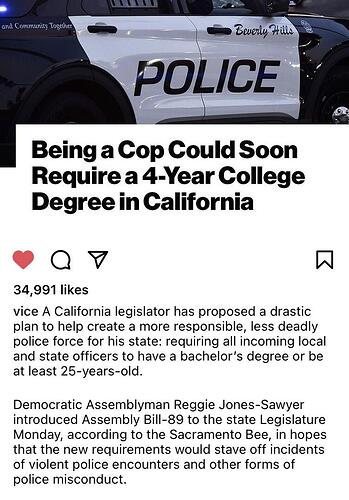“some people”.
That would be interesting to work out. It’s going to be on a state by state basis. The Not sure Feds can pass Federal law regulating state policing…
Because States have constitutional police power…to enforce state, county, and municipal law.
Basically, I do not think a 4 year degree is what is necessary to deal with the issues in policing.
I think it can be dealt with by reforming POST level training, as well as ongoing POST requirements for continuing education and training specific to policing. in order to maintain officer POST certification. Those programs and framework exist already.
A four year degree is like saying “everyone should go to college”. We know how well that has worked out in the general population, right?
In fact, one could say this “four year degree” requirement is kind of elitist.
I’d go for better psych screening of POST candidates and hires, which should be ongoing during training.
And training with more emphasis on the things people are complaining about: de-escalation, lack of skill at arresting methods, especially grappling, awareness of personal biases, etc. Officer survival is a HUGE thing in their training. As it should be.
So, there is a spectrum of ability of people who graduate POST. The best guys and gals get sucked up by bigger agencies. Which makes sense, they have more money, better bennies, better working conditions. The smaller agencies get the dregs.
Anyway, I think it’s way more complex than “4 year degree”.

